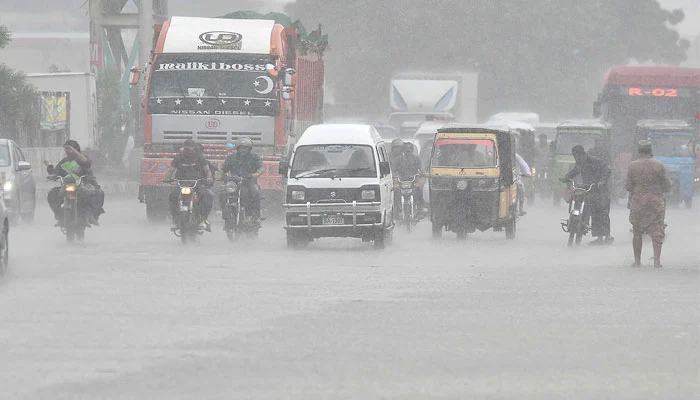KARACHI: On Saturday, the National Disaster Management Authority (NDMA) reported that Cyclone Asna now stands about 230 kilometres from Karachi. It is also 180 kilometres from Ormara and 300 kilometres from Gwadar.
As the cyclone moves away from Sindh’s coastal belt, it will track further west-southwest towards the coast. It will then proceed towards Oman before dissipating at sea without making landfall.
During this time, the meteorological department expects sea conditions to remain rough. Winds are likely to blow at 60 to 70 km/hour in the metropolis.
The authority advised fishermen in Sindh not to venture into the sea today. Fishermen in Balochistan must avoid going into the deep sea until tomorrow.
In the wake of the cyclone, the NDMA’s National Emergencies Operation Centre (NEOC) alerted residents to potential coastal flooding along the coast of Sindh. It also warned of possible pluvial flooding or inundation in low-lying areas.
Meanwhile, the NDMA also said that the city might experience strong windstorms. These windstorms could pose a threat to crops, billboards, electrical poles, solar panels, and hoardings.
Additionally, thunderstorms will increase the risk of lightning strikes, and disruptions may occur to electricity and other utility services.
Authorities advise the public to avoid visiting the seaside and beach areas due to potential hazards. They also urge residents to stay vigilant and follow local guidance.
NDMA has issued instructions to all relevant departments to take necessary precautions to mitigate the possible effects of flooding and extreme weather.
Rainfall in Karachi During Early Hours
The traffic police in Karachi advised drivers to drive at a slower speed and at a distance from other vehicles as the city received rain throughout last night under the influence of cyclone Asna.
Earlier today, rain drenched Karachi’s II Chundrigar Road, Saddar, Burns Road, and surrounding areas. Heavy rain also hit Defense View, Mehmoodabad, Akhtar Colony, Defence, Korangi, Qayyumabad, and Sharea Faisal.
Additionally, Nursery, PECHS, Tariq Road, Clifton, Kharadar, Tower, Boat Basin, Garden, Exhibition, and MA Jinnah Road also received rainfall Saturday morning.
Drivers must avoid braking suddenly as it may potentially lead to a disaster, owing to the slippery roads as a result of wet conditions, traffic police said.
Karachi’s Rizvia, Gulbahar, Nazimabad, Model Colony, Airport, Malir, Shah Faisal Colony, Landhi, Guru Mandir, Federal B Area, Ayesha Manzil, Karimabad, Liaquatabad, Teen Hatti, and other areas also received rainfall.
This news is sourced from The News and is intended for informational purposes only.






